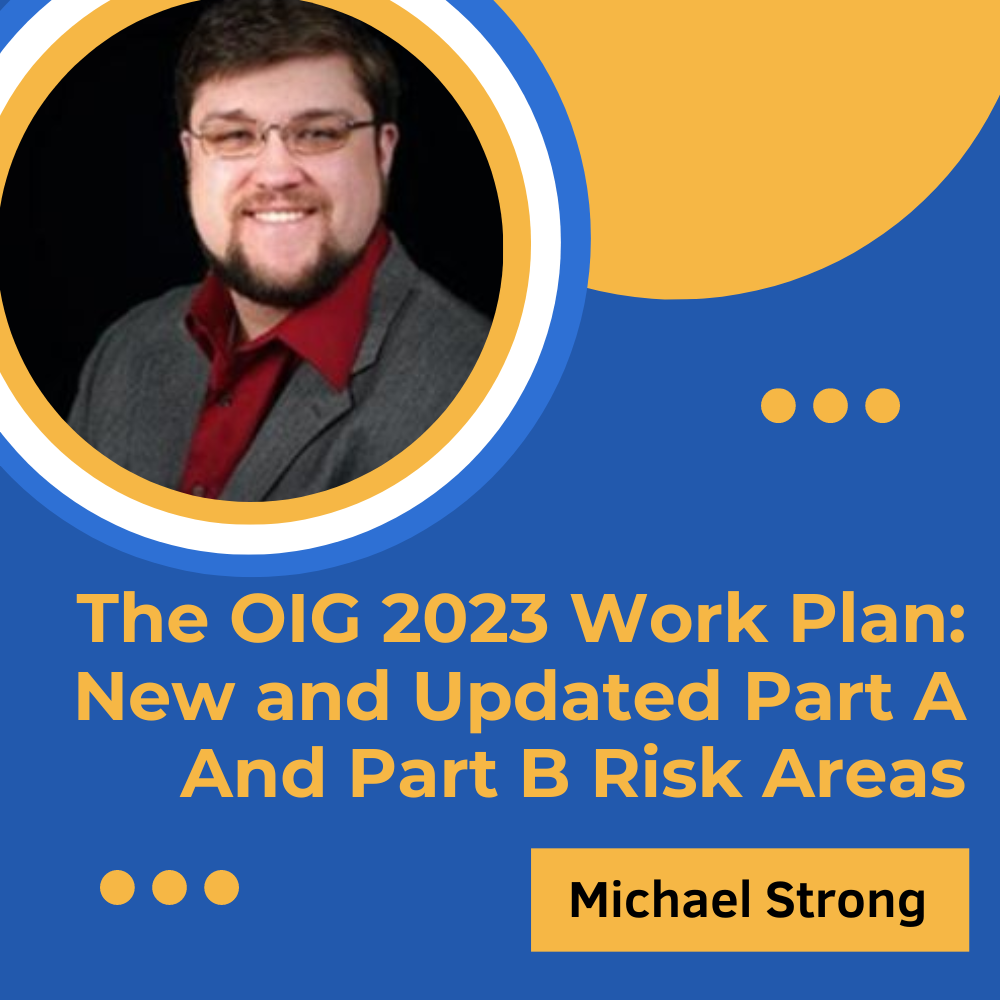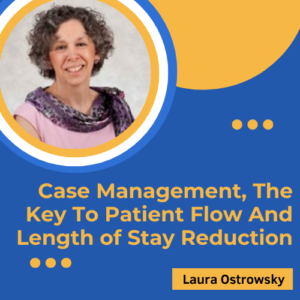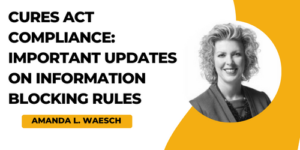Conference Material (Password Required)
As we welcome a new year, the federal government is quickly underway conducting audits and investigations through the Office of Inspector General (OIG) to target areas of focus and opportunity. In the 2023 OIG Work Plan, many major themes demonstrate the thoughts around the future of healthcare in this country.
As a country learns to live with COVID as a virus that co-exists with the flu or other respiratory illnesses, the government is looking at how well the country’s health system can handle future pandemics. The OIG will examine laboratory services and pandemic assistance payments. Changes to Medicare’s payment methodologies for lab services create a question as to whether the system was reactive and not proactive in protecting Medicare funds and ensuring adequate reimbursement to providers. However, utilization changes have also occurred that cause questions on the non-COVID tests that are decreasing and could impact the quality of care and properly monitoring patients for severe illnesses.
OIG expanded the COVID audit to examine how regulations expanded telehealth options and access to ventilators early in the pandemic. Audits will explore telehealth both broadly and target the home health industry which recently underwent major reimbursement changes around the time of the pandemic’s announcement. With home health services moving from a 60-day episodic payment-based system to a patient-driven grouper model (PDGM) with 30-day payment rates, the use of telehealth has prompted a need to conduct further investigation into this area. Telehealth remains a major concern for providers and payers. Quality of care via telehealth is one concern. Payment for those services remains another. Before the pandemic telehealth services had reimbursement impacted through the site of service differential. During the pandemic, telehealth services and COVID-19 in hospitals resulted in the discontinuation of the site of service differential to clinicians with add-on payments to facilities.
As OIG looks into telehealth, it will also look into mechanical ventilation, which primarily impacted nursing homes and hospitals. However, OIG could not stop at just mechanical ventilation. Two recurring themes continue to appear in the OIG work plan. This includes discharges and discharge transfers from both hospitals and nursing facilities. Despite changes to nursing home regulations including an ombudsman to prevent inappropriate discharges, the largest complaints about nursing homes still include discharges. OIG needs to look to see if there are changes needed to the regulations either on the ombudsmen or on the facilities themselves. Hospitals are where the reoccurring theme approaches. Are we tired of hearing about the two-midnight rule and post-acute hospital transfers? Well OIG is still targeting those two issues for compliance.
The next issue appears to be a bit more unusual for OIG. For a government that is mostly reactionary, OIG is taking a very proactive approach to physician-dispensed and administered drugs as well as prescription and pharmaceutical drugs. This could be a pre-text to help identify 10 drugs for Medicare to negotiate pricing under the Inflation Reduction Act or it could be a more general approach to see if there is more than the government needs to do around drug costs in this country.
OIG could not stop there. Next OIG is exploring the correct use of place of service codes. That could drive payment for the site of service differential. They are also going to be auditing emergency medicine services for potential upcoding. Additional audits will occur in spinal management services and dermatology. Dermatology has been an ongoing target both for medical necessity, upcoding and unbundling.
Transparency in coverage will be another point of contention. OIG wants to ensure that the providers, particularly hospitals and payers, are complying with transparency in coverage as required in rules issued before the No Surprises Act and as codified in the No Surprises Act.
These are the biggest issues and among the many OIG will target in 2023. How do these impact your practice and how can you prepare?
Learning Objective:
- Review the past legislative and policy changes that brought us where we are today in healthcare.
- Understand how COVID-19 caused questions about how payment methodologies work and the ability to properly manage healthcare costs in unforeseen circumstances.
- Understand what payers and providers are doing and considering to prepare for the future of healthcare reform.
- Understand how drugs, labs, and the pandemic all created a perfect storm in the 2023 audit.
Areas Covered in the Session:
- Billing Transfer Cases
- Transparency in Coverage Compliance
- Provider Readiness for the Next Pandemic
- Inflation Reduction Act
- Adverse Determination Consequences of OIG
- Prescription Drug Pricing and Policies
- Place of Service Codes and Telehealth
- Reimbursement Methodologies for hospitals, home health, biologics and/or injectables, and labs
Related Webinar
Suggested Attendees:
- Professionals
- Healthcare Policy Analysts
- Reimbursement Specialists
- Healthcare Business Researchers
- Revenue cycle management (RCM) companies
- Hospitals
- Payors
- Practice Managers
- Collection Companies
- Legislative or Regulatory Advisors and/or Lobbyists
- Lab Companies
- Home Health Providers
Presenter Biography:
Michael Strong has been working in healthcare for nearly 20 years with payers and providers. He is a former healthcare fraud investigator for the payers with millions in recoveries, a former EMT-B, and a certified coder. His experience includes commercial, Medicare, Medicaid, workers’ compensation, and auto medical claims. With publications and presentations in healthcare coding and billing, Mike has a diversified background in healthcare reimbursement and payment integrity.
Snippet From Our Previous Session
TESTIMONIALS
“Jim Sheldon-Dean’s insights on privacy and security were very much helpful to our team, it was great to learn from an instructor like him. Appreciate!” –CHRISTINE JACOB MD, CDI SPECIALIST
“This program on HIPAA did a great job providing actionable concepts in a way that updated our team and me, I now know how I will implement the concepts because I already did it in their online seminar, it was easy to ask questions from the speaker at the end of my 60 minutes course.” –MELISSA PRESTON, HEALTH INFORMATION MANAGEMENT STAFF
“The workshop was very insightful and made absolute sense in terms of the regulations and their compliance. I am thankful for having the opportunity to attend.”–BARBARA CAPRIOTTY, REHABILITATION DIRECTOR




